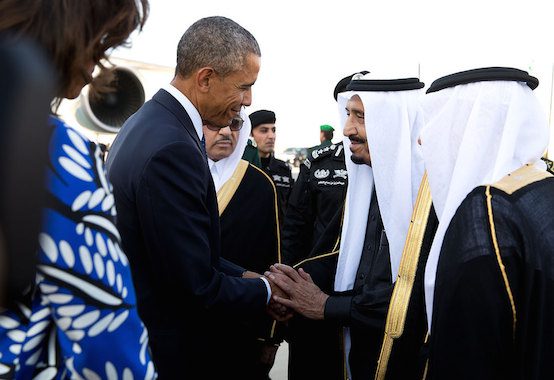Yemen and the Folly of “Reassuring” Bad Clients

Rouala Khalaf highlights the costs of “reassuring” our bad clients in the Neat East:
But it is in Yemen that the US mollification of Arab allies could have the most destructive impact. At a time when the US priority is — and that of all its allies should be — the fight against the Islamic State of Iraq and the Levant, the group known as Isis, Washington has supported a Saudi-led military campaign that has spread more chaos.
To make matters worse, the U.S. has no need to mollify its clients, but it does anyway. They already get a great deal out of the relationship with Washington, and they contribute virtually nothing in return, but all they need to do to get more out of the relationship is to make noises about how neglected they are. We have an absurd situation in which the U.S. feels compelled to bribe and indulge despotic client states at the same time that those states pursue regional policies that are actually at odds with our interests, and our government does this not to avoid “losing” these clients to another patron but only to keep them from moaning too loudly in public. Far from benefiting the U.S., these client relationships keep pulling us deeper into regional conflicts that our government has no business joining. Yemen is the most obvious example of this, but it isn’t the only one, and if this pattern continues it won’t be the last.
As Khalaf notes later in her column, U.S. support for the campaign in Yemen hasn’t had the effect of “reassuring” the Gulf states, but has prompted a new round of complaints: “Gulf officials are vocal about their frustrations — the US, they say, is not doing enough for them in Yemen [bold mine-DL].” In other words, these officials expect the U.S. to take on more of the costs and risks of an unnecessary and reckless war that their governments started. Since the Saudi-led coalition has struggled to make much progress in their intervention, it’s not surprising that they want the U.S. to bail them out of their horrible blunder, but there is absolutely no reason why the U.S. should do any more than it already has. Indeed, the U.S. should never have lent support to this campaign, and failing that ought to have withdrawn its backing months ago. U.S. backing for this war is one of the most disgraceful episodes of reckless interventionism in recent history, and it is fitting that the administration’s terrible decision to take sides in the war hasn’t even “reassured” the despotic governments that it was meant to satisfy.
This is what the U.S. was bound to get by indulging these clients in the first place: increased demands for even more indulgence. Client governments know that if they complain loudly enough they will be able to extract more benefits from Washington, which is always far too eager to placate its clients’ whining. The client states in the Gulf therefore have every incentive to blame the U.S. for being too stingy, and they are repeatedly rewarded for doing this. Even though the U.S. is aiding the Saudis and their allies in an unnecessary war that is at odds with our own security interests, they demand even more assistance with the knowledge that many of our political leaders are keen to placate them regardless of the cost to America.
Comments